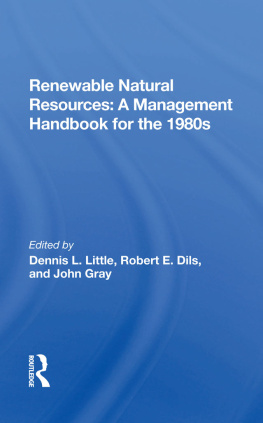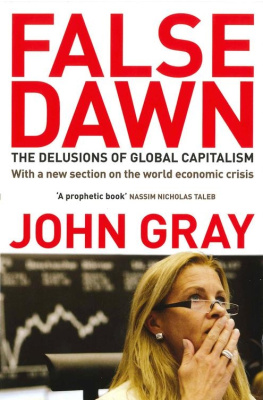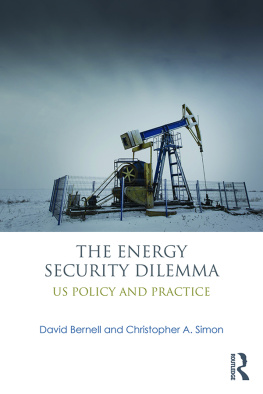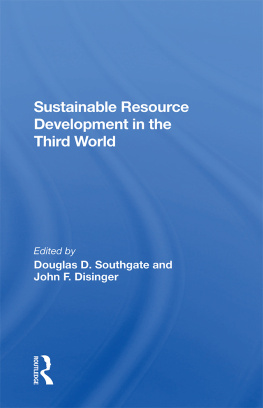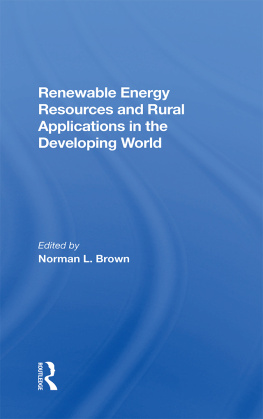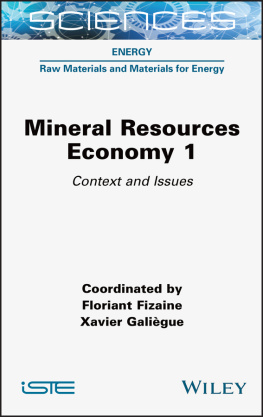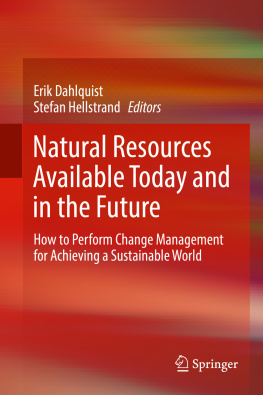Renewable Natural Resources: A Management Handbook for the 1980s
Also of Interest
The Economics of Environmental and Natural Resources Policy, edited by J. A. Butlin
Ecology and Environmental Management: A Geographical Perspective, C. C. Park
Energy Futures, Human Values, and Lifestyles: A New Look at the Energy Crisis, Richard C. Carlson, Willis W. Harman, Peter Schwartz, and Associates
Energy Transitions: Long-Term Perspectives, edited by Lewis J. Perelman, August W. Giebelhaus, and Michael D. Yokell
Energy from Biological Processes: Technical and Policy Options, Office of Technology Assessment
The Forever Fuel: The Story of Hydrogen, Peter Hoffmann
Living with Energy Shortfall: The Future of American Towns and Cities, Jon Van Til
Water and Energy in Colorado's Future: The Impacts of Energy Development on Water Use in 1985 and 2000, prepared for the Colorado Energy Research Institute
Western Water Resources: Coming Problems and the Policy Alternatives, a symposium sponsored by the Federal Reserve Bank of Kansas City
Managing Ocean Resources: A Primer, edited by Robert L. Friedheim
Georges Bank: Past, Present, and Future of a Marine Environment, Guy C. McLeod and John H. Prescott
Climate Change and Society: Consequences of Increasing Atmospheric Carbon Dioxide, William W. Kellogg and Robert Schware
Future Dimensions of World Food and Population, edited by Richard G. Woods
Available in hardcover and paperback.
Westview Special Studies in Natural Resources and Energy Management
Renewable Natural Resources: A Management Handbook for the 1980s
edited by Dennis L. Little, Robert E. Dils, and John Gray
Enormous in scope, this book presents in comprehensive and logical form the sum of our national knowledge about renewable energy resources. It deals with these resources in terms of opportunities and dangers, in terms of current availability and possible expansion, in terms of how natural resources relate to human resources and needs, and in terms of their replacement potential for nonrenewable resources such as fossil fuels. It also puts domestic resources and needs into the context of international needs, supplies, and policies, emphasizing the issues facing an interdependent world and the urgent requirements perceived by countries less endowed than the United States.
This is a handbook for the concerned citizen as well as for resource managers and policymakers at local, regional, and national levels. The analyses it contains underscore the fact that there are no easy answers: everything is part of an interlocking system, and every decision will affect multiple aspects of our daily lives and indeed our very existence. The authors emphasize the crucial importance of early planning, balanced management, and timely decisions, while suggesting that something more is requireda new ideology and a new educational approach.
More than two hundred experts associated with the U.S. Departments of Agriculture and Energy, the Congressional Research Service, the U.S. Senate, and many of the nation's outstanding universities, think tanks, and consulting firms participated in the creation of this book. Dennis L. Little, senior editor, is a specialist in futures research at the Congressional Research Service of the Library of Congress. Robert E. Dils was formerly director of Forest Environment Research for the U.S. Forest Service, and John Gray is director of the Pinchot Institute for Conservation Studies, U.S. Forest Service.
First published 1982 by Westview Press, Inc.
Published 2019 by Routledge
52 Vanderbilt Avenue, New York, NY 10017
2 Park Square, Milton Park, Abingdon, Oxon OX14 4RN
Routledge is an imprint of the Taylor & Francis Group, an informa business
Copyright 1982 Taylor & Francis
All rights reserved. No part of this book may be reprinted or reproduced or utilised in any form or by any electronic, mechanical, or other means, now known or hereafter invented, including photocopying and recording, or in any information storage or retrieval system, without permission in writing from the publishers.
Notice:
Product or corporate names may be trademarks or registered trademarks, and are used only for identification and explanation without intent to infringe.
Library of Congress Cataloging in Publication Data
Main entry under title:
Renewable natural resources.
(Westview special studies in natural resources and energy management)
Includes index.
1. Renewable natural resourcesGovernment policyUnited States. 2. Conservation of natural resourcesGovernment policyUnited States. 3. Energy policyUnited States. I. Little, Dennis L. II. Dils, Robert E. III. Gray, John, 1920 . IV. Series.
HC103.7.R38 333.7 81-15986
AACR2
ISBN 13: 978-0-367-28563-0 (hbk)
As we move into the latter part of this century, two things have become increasingly apparent. First, the human world has become more and more complex and interdependent. The complexity is in part the result of the industrial revolution (greater specialization, larger scale, increased efficiency of production, and managerial control). The very scale of our systems in many cases has reduced competition (the cost of entry is too high), decreased the rate of innovation, and increased tendencies to maintain the status quo. The interdependency of our various systems is best seen by looking at our economic systems. In terms of international trade, Japan uses coal from West Virginia and iron ore from Australia to make automobiles and then sends them around the world on ships powered by oil from the Persian Gulf. On a more personal level, the typical U.S. male may shave in the morning with an English blade, drink a coffee from Brazil, drive to work in a Japanese or German auto, and while doing so, listen to a tape recorder made in Korea. The interdependency and rigidity of the systems have led to a variety of policy problems. If system A and system are interdependent, changes in system will cause changes in system A and vice versa. The changes in one system may not be favorable to the other, but the necessary policy options to make compensatory systemic adjustments may not be within the control of the affected system's policymakers.
This increasing complexity and interdependency leads to the second point. The disciplinary structure under which we have been educated poses barriers in dealing with the issues and opportunities emerging from these complex and interrelated systems. Our specialized educational programs simply do not provide an adequately integrated analytical knowledge base. Two brief examples from the physical and social sciences can clearly illustrate the problem. The aim of the nineteenth-century scientist was to prove the immutability of the physical laws; the aim of the twentieth-century scientist is to prove the mutability of the physical laws, in terms of history, there are many books depicting a different prime cause for the decline and fall of the Roman Empire. (Also, Arthur Schlesinger, Jr., ceased writing the Age of Roosevelt when he left the Kennedy White House, for contemporary histories depicted events in the Kennedy White House, in which Schlesinger had participated, as distinctly different from Schlesinger's recollections.)

